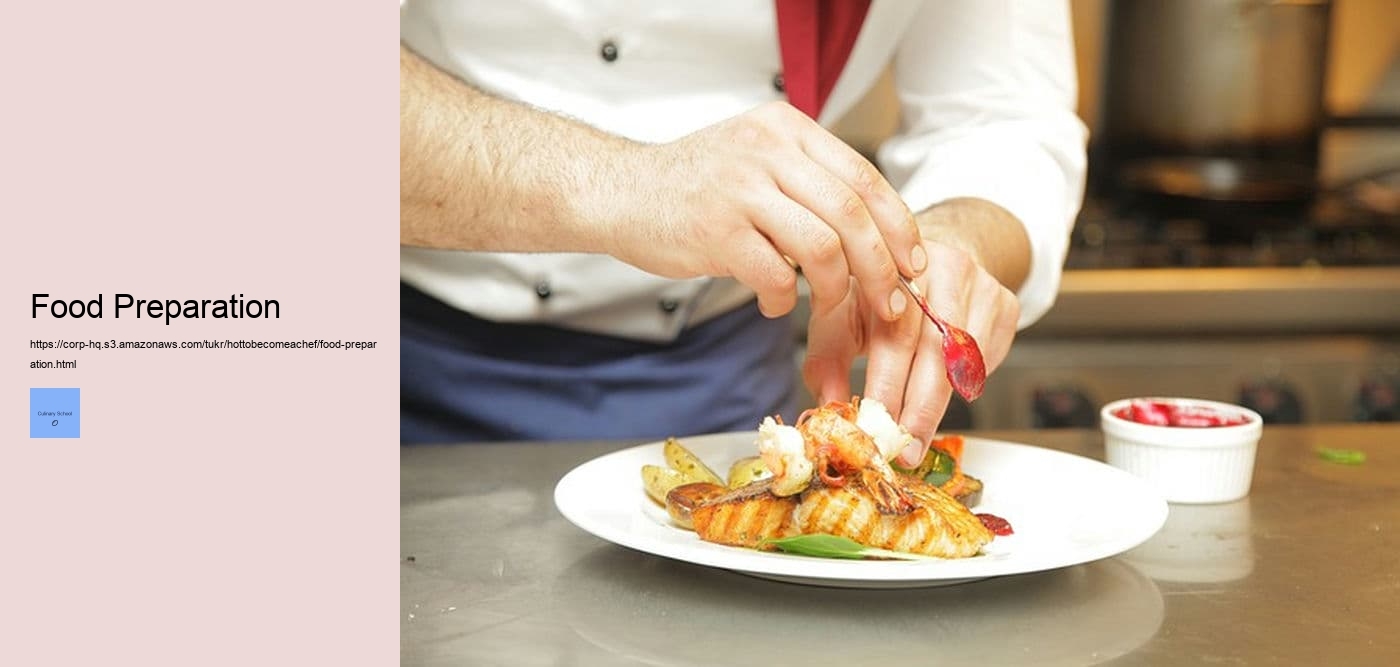

Intro(duction) to Food Prepa(ration)! Preparing food is not an easy task, it requires a lot of skill and patience. Obtaining experience working in restaurant kitchens under experienced chefs allows you to build fundamental cooking skills while learning how to thrive in an intense work environment. Sanitation Practices Business management. Gaining experience working in restaurant kitchens under experienced chefs allows you to build fundamental cooking skills while learning how to thrive in a fast-paced work environment. How to become a chef Kitchen experience. Not (to mention) the creativity! You need to have a good understanding of ingredi(ents), flavors, and textures. Landing a job as a chef in a top restaurant involves building relationships with food vendors, distributors and fellow industry professionals. Sanitation Practices Food safety practices. As you advance in your culinary career, focus on developing your own unique cooking style and specialty dishes that showcase your talents. How to become a chef Cooking techniques. It can be quite daunting at first, but (with) practice you'll get the hang of it in no time. For example, when making a salad one has to consider the type of lettuce, vegetables and dressings that will go into it. Additionally, one must also think about how much salt and pepper they should add for flavor!
Moreover, (it's important) to pay attention to details such as chopping vegetables evenly so as not to ruin their texture. Furthermore, you should take your time so as not assimilate the ingredients together prematurely! Lastly, don't forget that presentation is key! A great looking dish will make people enjoy their meal even more. To conclude, food preparation may seem difficult at first glance but with practice it's fun and simple!
Different techniques of food preparation can be a bit daunting to learn, but they're essential for creating delicious meals! For starters, (cooking) is the process of preparing food through the use of heat. Roasting, grilling and baking are all popular methods. Simmering and boiling are also used frequently – perfect for making soups and stews.
Moreover, stir-frying is another technique that involves cooking small pieces of food in a hot skillet with oil. This provides a great way to infuse intense flavor into dishes quickly. When it comes to frying, deep-frying is an excellent way to cook various foods until they become crispy on the outside yet still juicy on the inside. Lastly, sautéing is similar to stir-frying except that usually less oil is used and longer cooking times are required.
In addition, steaming (is) a great cooking method as it helps preserve nutrients and flavors better than other options like boiling or microwaving. Poaching involves simmering foods in liquid such as stock or water which makes them succulent and moist throughout; poached eggs being a prime example! Lastly, braising combines both dry heat from roasting or baking along with low levels of moisture added during the process - perfect for tougher cuts of meat!
All in all, there's no shortage of ways to prepare food! With careful practice you can master these different techniques of food preparation so you can make your favorite dishes tastier than ever before!
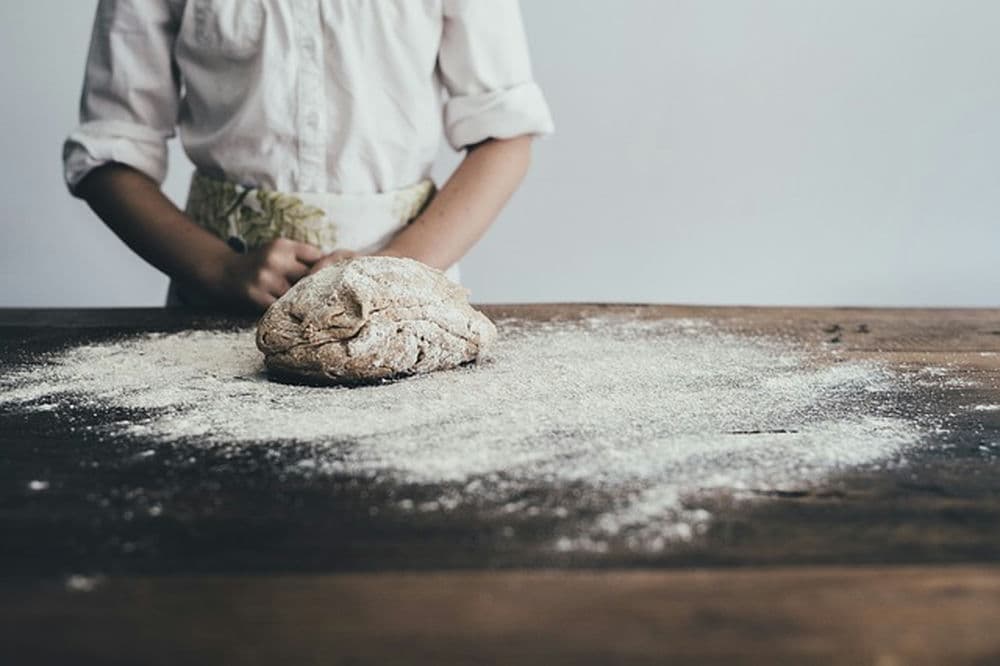
Becoming a professional chef is no easy feat!. It requires hard work, dedication (and) an immense amount of skill.
Posted by on 2023-09-03
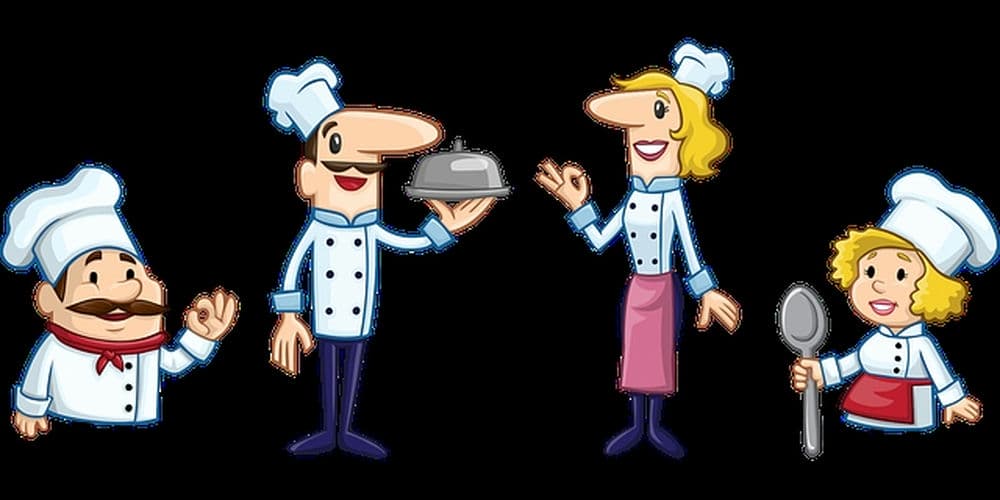
Becoming a professional chef can be an exciting and rewarding career!. To get started on the path, it's important to take advantage of any educational resources available to you.
Posted by on 2023-09-03

Working abroad for a diverse experience can be an incredibly rewarding and exciting opportunity.. It can open up new doors and provide many unique experiences unavailable in one’s own country. (However,) it is important to consider the potential risks and drawbacks associated with working in a foreign setting.
Posted by on 2023-09-03
Food Preparation is an important part of everyday life. Without proper tools, it would be difficult (or impossible!) to make delicious meals. There are many different tool needed for food preparation, some more necessary than others. To begin, a cutting board and knife are vital (for slicing and dicing). A couple other utensils that come in handy are a large spoon and spatula. For stirring sauces or soups, a whisk is also invaluable!
Furthermore, measuring cups and spoons help ensure you use the correct amount of ingredients when cooking. A vegetable peeler comes in useful when peeling fruits or veggies. And finally, having tongs on hand can make flipping meat or vegetables much easier! Altogether these tools will make your food preparation process smoother and faster. Plus, they'll help create scrumptious dishes that everyone will love!
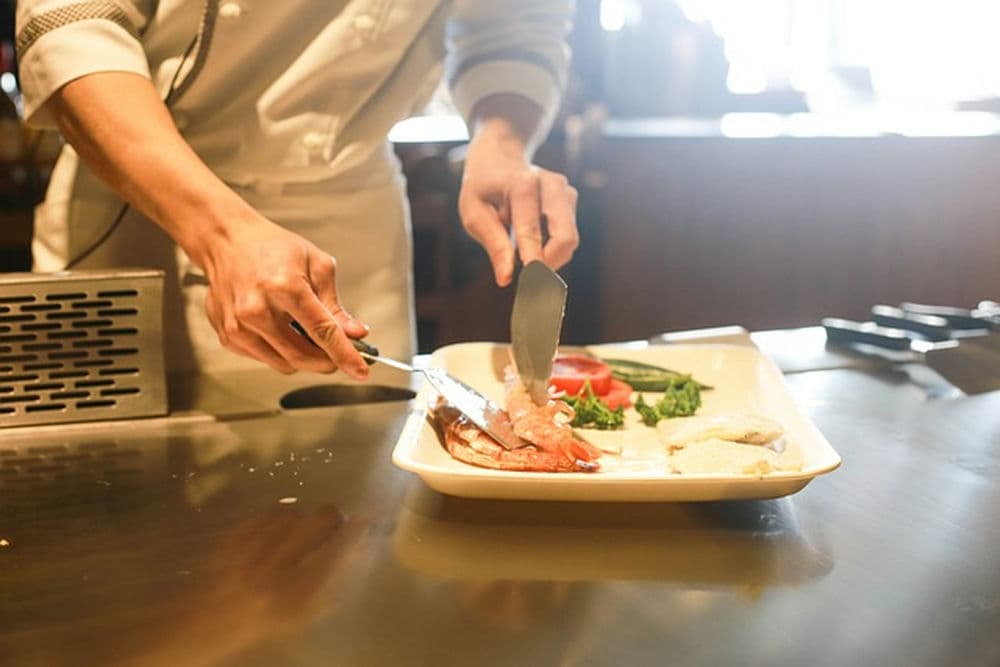

Food preparation is a crucial part of any meal. It's important to keep health and safety in mind when prepping food. (!) First, always wash your hands before beginning to prepare any meal! This will help prevent the spread of germs and bacteria. Additionally, make sure you're using clean utensils for each task; don't mix-n-match or use the same knife for different ingredients. Furthermore, never defrost thawed foods at room temperature; instead do it in the fridge overnight or with cold water.
Moreover, separate cooked and uncooked foods while preparing meals to avoid cross contamination. Don’t forget to regularly sanitize kitchen surfaces with antibacterial wipes or sprays as well! Finally, never leave perishable items out for too long as they will start to spoil quickly; store them away in the refrigerator ASAP. All these tips should be kept in mind when prepping food - they can help keep your family safe from potential illnesses and other issues.
In conclusion, following basic health and safety tips for food preparation are essential if you want to ensure that your meals are healthy and safe for consumption! Take some time to read up on these tips - you won't regret it!
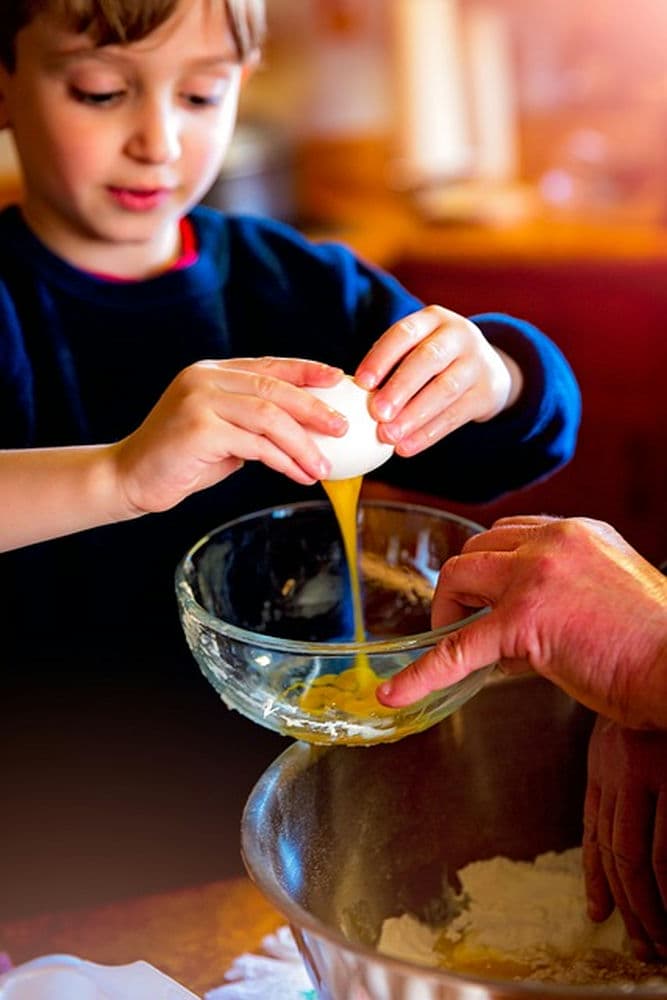
Proper food preparation (is an) essential part of the cooking process! It not only ensures that meals are safe to eat, but can also greatly enhance the taste and nutritional value of dishes. Neglecting to take the time to properly prepare ingredients can lead to a meal that is unappealing and nutritionally deficient. So why should one bother with proper food prep? Here are some great benefits of doing so.
Firstly, properly preparing food reduces your risk for contamination or food poisoning. Fruits and vegetables must be washed thoroughly in order to remove dirt, pesticides, and bacteria that may still be present. Meats must be defrosted gradually in order to prevent harmful bacteria from forming; it's important not to rush this step as improper thawing could result in illness! Furthermore, using separate cutting boards for meats and other foods helps decrease the chances of cross-contamination.
Transition: In addition to ensuring safety, proper food preparation can increase flavor.
For instance, marinating meat before cooking adds extra flavor by allowing spices and seasonings time to penetrate into the flesh. For fruits and vegetables, peeling off skins often brings out richer flavors underneath while also making them more tender when cooked. Many people find (that) chopping ingredients into smaller pieces also enhances their taste as it increases their surface area which allows seasonings to stick better during cooking - plus it speeds up cook times too!
Finally, properly preparing foods is beneficial because it aids digestion and maximizes nutrient absorption . Raw fruits and veggies contain enzymes which help break down proteins into amino acids - something our bodies cannot do on its own! By taking care when prepping these types of foods you're helping your body get maximum nutrition out of what you eat!
All in all, there are many advantages that come with investing the time into proper food preparation beforehand - not only will it make meals safer but tastier too!
Preparing food is an art, and it can be tricky if you don't know what to avoid. One of the most (comman) mistakes people make when prepping food is not washing their hands before starting. This can lead to bacteria spreading, and it's a surefire way to get sick! Additionally, using contaminated utensils should be avoided at all costs. Not only do they contaminate the food itself, but also they risk transferring germs from one dish to another.
Moreover, failing to accurately measure ingredients is (another) mistake that some people make. A lot of recipes require exact measurements for everything from spices to liquids in order to achieve the desired flavor or consistency. Therefore, having a set of measuring spoons on hand will help ensure accuracy when prepping food.(On top of that,) forgetting to check expiration dates on ingredients can have serious consequences as well. Using expired items can cause illnesses and even spoil dishes. Therefore, always double-check expiry dates before cooking with any ingredient!
Finally, not following recipe instructions closely enough can also ruin dishes. Even though some directions may seem unimportant or unnecessary at times, omitting steps could drastically alter the end result in a negative way! So pay close attention when reading through recipes and try your best not to skip anything important; otherwise you might be in for a nasty surprise!
To sum up, preparing food involves many crucial elements like handwashing and measuring correctly which must be taken into consideration in order for meals to turn out perfectly. Furthermore, checking expiration dates and following instructions precisely are just as essential - so don't forget about these common mistakes when prepping food !
Food preparation is a vital part of everyday life. No matter what the cuisine, it takes skill and creativity to produce delicious dishes! (Negation) There isn't one specific way to prepare food, as there are many different methods and ingredients that can be used. For instance, boiling, grilling and frying are common cooking techniques. Furthermore, herbs and spices can be used to add flavor to any dish!
In conclusion, food prepartion involves an array of elements that come together in order to result in something tasty. It requires attention to detail and a certain level of talent to create something unique and enjoyable. Consequently, it is important for people to take their time when preparing meals in order for them to enjoy their culinary delights!
Food preparation is an important part of our daily lives. It can be both challenging and rewarding. We have access to many (resources) that can help us with this task. Firstly, there are (plenty) of recipes available online. This provides a vast variety of meals to choose from, as well as tips on how to prepare them! Secondly, we may utilize cookbooks for specific needs such as dieting or baking. Additionally, we can watch cooking shows for guidance and inspiration. Furthermore, local grocery stores often offer classes on food prep and nutrition.
On the other hand, it's also vital to know about the hazards of food preparation! For example, improper handling of raw meat can lead to food poisoning and cross contamination if not done correctly. Moreover, it's essential to pay attention when utilizing sharp tools like knives or graters since they can cause serious injury if you're not careful enough. Finally, always follow instructions carefully when using kitchen equipment such as ovens or microwaves in order to avoid any potential accidents or harm!
All in all, there are lots of resources out there that will aid us with food prep - from recipes and cookbooks to cooking classes and safety advice - so let's make sure to use them wisely!